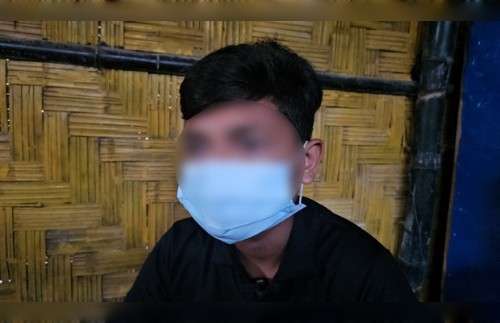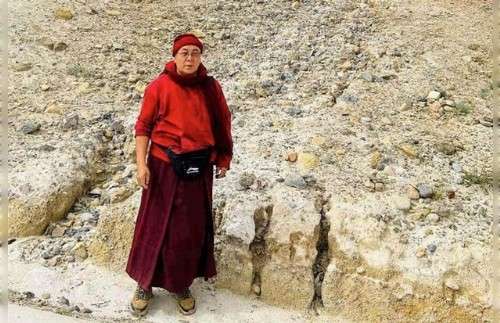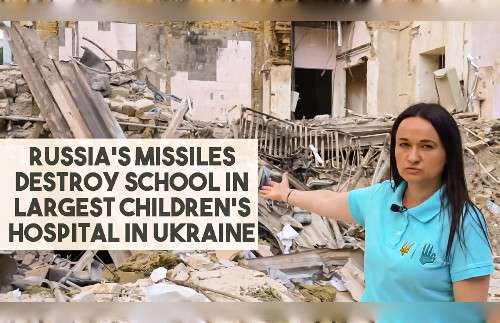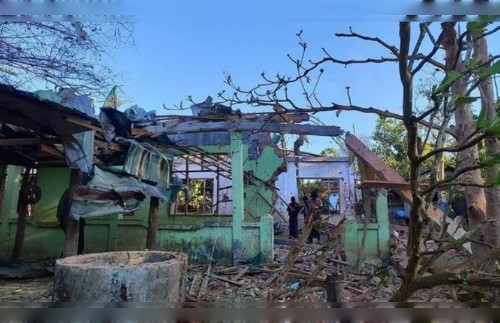
- Boko Haram abducted thousands of children as soldiers or ’wives’
- Military subjects children to torture in prolonged, unlawful detention
- EU and other donors fund a flawed ‘rehabilitation’ programme
Nigeria must urgently address its failure to protect and provide education to an entire generation of children in the Northeast, a region devastated by years of Boko Haram atrocities and gross violations by the military, Amnesty International warned today in a chilling new report.
The 91-page report, ‘We dried our tears’: Addressing the toll on children of Northeast Nigeria’s conflict, examines how the military’s widespread unlawful detention and torture have compounded the suffering of children from Borno and Adamawa states who faced war crimes and crimes against humanity at the hands of Boko Haram.
It also reveals how international donors have bankrolled a flawed programme that claims to reintegrate former alleged fighters, but which overwhelmingly amounts to unlawful detention of children and adults.
“The past decade of bitter conflict between Nigeria’s military and Boko Haram has been an assault on childhood itself in Northeast Nigeria. The Nigerian authorities risk creating a lost generation unless they urgently address how the war has targeted and traumatized thousands of children,” said Joanne Mariner, Acting Director of Crisis Response at Amnesty International.
“Boko Haram has repeatedly attacked schools and abducted large numbers of children as soldiers or ‘wives,’ among other atrocities.
“The Nigerian military’s treatment of those who escape such brutality has also been appalling. From mass, unlawful detention in inhumane conditions, to meting out beatings and torture and allowing sexual abuse by adult inmates – it defies belief that children anywhere would be so grievously harmed by the very authorities charged with their protection.”
Between November 2019 and April 2020, Amnesty International interviewed more than 230 people affected by the conflict, including 119 who were children when they suffered serious crimes by Boko Haram, the Nigerian military, or both. This included 48 children held in military detention for months or years, as well as 22 adults who had been detained with children.
Boko Haram Brutality
Children have been among those most impacted by Boko Haram’s string of atrocities carried out over large swathes of Northeast Nigeria for nearly a decade. The armed group’s classic tactics have included attacks on schools, widespread abductions, recruitment and use of child soldiers, and forced marriage of girls and young women, which all constitute crimes under international law.

This pattern of crimes is well-known because of high-profile cases like the abduction of hundreds of schoolgirls in Chibok in 2014. However, the scale of abductions has been often underestimated and certainly appears to run into the thousands. Boko Haram continues to force parents to hand over boys and girls, under threat of death. It continues to forcibly “marry” girls and young women. And it continues to murder people who try to escape.
Children in areas under Boko Haram control have been subjected to torture, including floggings and other beatings, as well as forced to watch public executions and other brutal punishments.
A 17-year-old girl who escaped Boko Haram after being abducted and held in captivity for four years described life in the Sambisa forest: “[My] wicked ‘husband’ always beat me… My daily activities included praying, cooking if there was food, [and] going for Quranic lessons. No movement was allowed, and no visiting friends. It was a terrible experience, and I witnessed different punishments, from shooting to stoning to lashing.”
She, and most other former child “wives” interviewed — including some who returned with children born during captivity — had received little or no assistance in returning to school, starting livelihoods, or accessing psychosocial support.
“I’d like to go to school, but there’s no money,” said the 17-year-old girl. “The biggest help for me would be to go to school.”
Military Detention
Children who escape Boko Haram territory face a raft of violations by the Nigerian authorities, also including crimes under international law. At best, they end up displaced, struggling for survival and with little or no access to education. At worst, they are arbitrarily detained for years in military barracks, in conditions amounting to torture or other ill-treatment.
The UN told Amnesty International it has verified the release of 2,879 children from military detention since 2015, although it previously cited a higher figure of children detained between 2013 and 2019. These statistics are likely to be a vast underestimate, and the UN has said its access to military detention is restricted so it cannot provide the actual number of children detained in the context of the conflict.

Most such detentions are unlawful; children are never charged or prosecuted for any crime and are denied the rights to access a lawyer, appear before a judge, or communicate with their families. The widespread unlawful detentions may amount to a crime against humanity.
Almost everyone fleeing Boko Haram territory, including children, is “screened” by the military and Civilian Joint Task Force – a process that, for many, involves torture until the person “confesses” to affiliation with Boko Haram. Alleged Boko Haram members and supporters are transferred and held, often for months or years, in squalid conditions in detention centres including Giwa Barracks in Maiduguri and the Kainji military base in Niger State.
Every former detainee interviewed offered consistent, highly specific descriptions of the conditions: extreme overcrowding; a lack of ventilation amid stifling heat; parasites everywhere; and urine and faeces on the floor, because of the lack of toilets. Although there have been some improvements in recent years, many former detainees, including children, also faced grossly inadequate access to water, food, and health care.
Tens of thousands of detainees have been held in these conditions, which are so extreme that they constitute the war crime of torture. Many children continue to be held in such conditions, even after mass releases in late 2019 and early 2020. Amnesty International estimates that at least 10,000 people, including many children, have died in detention during the conflict.
A 14-year-old boy whom Boko Haram abducted as a young child before he fled and was placed in detention by the Nigerian military, said: “The conditions in Giwa are horrible. They could make you die. There’s no place to lie down… It’s hot, all your clothes were wet, like they put you in a river… Up to now, nobody has told me why I was taken there, what I did, why I was in detention. I wonder, why did I run from [Boko Haram]?”
Operation Safe Corridor
Amnesty International also documented violations at Operation Safe Corridor, a programme backed by millions of dollars in support from the EU, UK, USA, and other partners. The military-run detention centre outside Gombe was set up in 2016 with the aim of de-radicalizing and rehabilitating alleged Boko Haram fighters or supporters. It has seen around 270 “graduates” in several batches since.
Conditions are better at the Safe Corridor site than elsewhere in military detention, and former detainees spoke positively about the psychosocial support and adult education there. But most of the men and boys there have not been informed of any legal basis for their detention and still lack access to lawyers or courts to contest it. Their promised six-month stay has in some cases extended to 19 months, during which time they are deprived of liberty and under constant armed guard.
Former detainees there told Amnesty International that medical care was sorely lacking. Seven detainees died, many, if not all, after receiving inadequate medical care. The Nigerian authorities did not even notify their families – they were informed by released detainees instead.
The programme also subjects some detainees to unsafe work conditions. Some detainees suffered serious injuries to their hands after being made to work with caustic soda, a highly corrosive substance, without protective equipment. “The caustic soda is dangerous. If it touches your body, it will remove the flesh,” said a 61-year old former detainee.
“None of the major donors to Safe Corridor would sanction such a system of prolonged and unlawful detention for its own citizens, so why do they do so in Nigeria?” said Osai Ojigho, Director of Amnesty International Nigeria.
“Nigeria’s armed forces must release all children being arbitrarily detained and halt other violations that appear aimed at punishing thousands of children, many of whom were also victims of Boko Haram’s atrocities. A commitment to children’s education and psychosocial recovery could pave a new path for the Northeast.”
Copyright © 2020 Amnesty International
Escaping from Scam Center on Cambodia’s Bokor Mountain
UN Security Council Meets to Discuss Children and Armed Conflict
10 Shocking Revelations from Bangladesh Commission’s Report About Ex-PM Hasina-Linked Forced Disappearances
Migration Dynamics Shifting Due to New US Administration New Regional Laws
UN Security Council Meets to Discuss the Maintenance of International Peace and Security and Artificial Intelligence
Winter Brings New Challenges for Residents living in Ukraine’s Donetsk Region
Permanent Representative of Israel Briefs Press at UN Headquarters
Hospitals Overwhelmed in Vanuatu as Death and Damage Toll Mounts from Quake
Subscribe Our You Tube Channel
Fighting Fake News
Fighting Lies


















